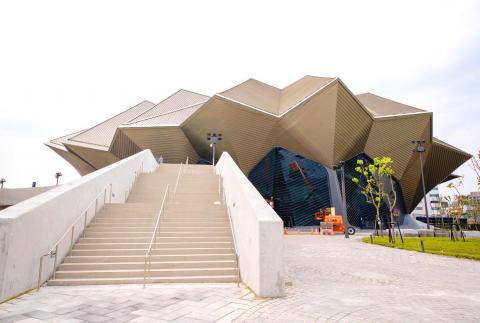The Control Yuan yesterday issued a corrective measure against government offices involved in the Taipei Music Center for the project’s increased costs and delays.
The Executive Yuan, the Ministry of Culture and the Taipei City Government have been negligent in their handling of the program, which has cost the nation an opportunity to grow the music industry and halt a brain drain in the music recording industry, the Control Yuan said in a report.
Although the Executive Yuan approved the project in February 2004, the center in Taipei’s Nangang District (南港) has been unable to begin operations due to multiple delays, indicating poor administrative oversight, the Control Yuan said in its report.

Photo courtesy of the Taipei Music Center
The project’s costs have risen from NT$4.6 billion to NT$6.1 billion (US$149.03 million to US$197.6 million), or an increase of 33.6 percent, showing a lack of fiscal control, it said.
The Executive Yuan suggested that the center’s seating capacity be increased from 3,000 to between 5,000 and 10,000, but the Taipei City Government refused to comply until the Legislative Yuan froze the budget item for a second time, it said.
The Executive Yuan asked for a larger center because the nation lacked medium-sized venues, a shortage that remains unaddressed due to the inability to open the center, the report said.
The government departments should also improve their budget distribution and oversight, as well as address safety concerns regarding the center’s redesigned aisles, which are too narrow, it said.
While the northern part of the center is completed, the southern part is behind schedule and the government departments should recalculate the project’s budget, the report said.
Although the Executive Yuan has stopped subsidizing the project, it should take on the responsibility of advising the Ministry of Culture and Taipei City Government to prevent the center from becoming another stagnant public project, it said.
The corrective measure was handed out by Control Yuan members Chen Hsiao-hung (陳小紅), Wang Mei-yu (王美玉) and Yang Fang-ling (楊芳玲), the report said.

Three Taiwanese airlines have prohibited passengers from packing Bluetooth earbuds and their charger cases in checked luggage. EVA Air and Uni Air said that Bluetooth earbuds and charger cases are categorized as portable electronic devices, which should be switched off if they are placed in checked luggage based on international aviation safety regulations. They must not be in standby or sleep mode. However, as charging would continue when earbuds are placed in the charger cases, which would contravene international aviation regulations, their cases must be carried as hand luggage, they said. Tigerair Taiwan said that earbud charger cases are equipped

Foreign travelers entering Taiwan on a short layover via Taiwan Taoyuan International Airport are receiving NT$600 gift vouchers from yesterday, the Tourism Administration said, adding that it hopes the incentive would boost tourism consumption at the airport. The program, which allows travelers holding non-Taiwan passports who enter the country during a layover of up to 24 hours to claim a voucher, aims to promote attractions at the airport, the agency said in a statement on Friday. To participate, travelers must sign up on the campaign Web site, the agency said. They can then present their passport and boarding pass for their connecting international

Temperatures in northern Taiwan are forecast to reach as high as 30°C today, as an ongoing northeasterly seasonal wind system weakens, the Central Weather Administration (CWA) said. CWA forecaster Tseng Chao-cheng (曾昭誠) said yesterday that with the seasonal wind system weakening, warmer easterly winds would boost the temperature today. Daytime temperatures in northern Taiwan and Yilan County are expected to range from 28°C to 30°C today, up about 3°C from yesterday, Tseng said. According to the CWA, temperature highs in central and southern Taiwan could stay stable. However, the weather is expected to turn cooler starting tonight as the northeasterly wind system strengthens again

Taiwan sweltered through its hottest October on record, the Central Weather Administration (CWA) said yesterday, the latest in a string of global temperature records. The main island endured its highest average temperature since 1950, CWA forecaster Liu Pei-teng said. Temperatures the world over have soared in recent years as human-induced climate change contributes to ever more erratic weather patterns. Taiwan’s average temperature was 27.381°C as of Thursday, Liu said. Liu said the average could slip 0.1°C by the end of yesterday, but it would still be higher than the previous record of 27.009°C in 2016. "The temperature only started lowering around Oct. 18 or 19